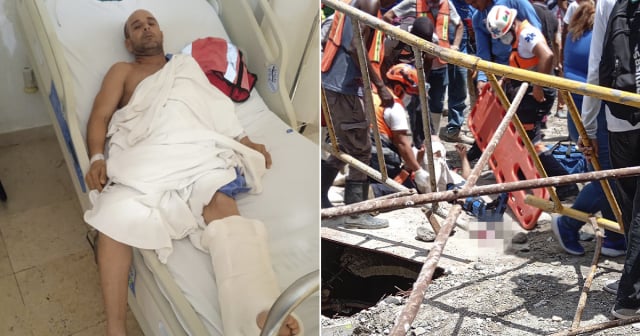A Cuban resident in Texas, working at the port of Houston, suffered a serious work accident when part of a cargo shipment collapsed and fell on him, leaving him trapped for more than 10 minutes without medical assistance.
The accident occurred while the worker, whose name has not been revealed, was next to a forklift and a large amount of merchandise fell on his body, crushing his vital organs.
Despite the pain and anguish, the man remained conscious and managed to stream a live video in front of his colleagues, to denounce that they were not helping him, even though he was desperately asking for assistance.
"Brother, take the load off me. I've been here in the port of Houston for over 10 minutes with a load on me that fell, carrying it here, and they don't want to take it off me. I'm going to die. I have children who need me. They're going to leave me to die here. Brother, take the load off me!" implored the Cuban.
He assured that his spine was intact, but he felt that the pressure from the load was compromising his organs. The colleagues did not intervene, leaving him waiting for the arrival of emergency services.
Why did nobody remove the load from the Cuban injured at the port of Houston?
The delay in assisting the worker could be related to the safety protocols and legal responsibilities that govern this type of workplace incident in the United States.
In accidents like the one that occurred at the port of Houston, employees are usually trained not to intervene until the arrival of specialized emergency teams, for various reasons:
1. Avoid exacerbating injuries: In situations of entrapment under a heavy load, moving the material without proper equipment or without considering the medical conditions of the victim could worsen the injuries.
Although the worker assured that his back was fine, any incorrect movement could have caused serious damage that would affect his recovery ability. This type of risk could discourage colleagues from intervening.
2. Legal responsibility: In many cases, employers and workers are subject to strict regulations regarding occupational health and safety.
Acting without the proper training or equipment could expose the company and employees to negligence lawsuits, especially if the victim's condition worsens as a result of unauthorized intervention.
3. Dependency on emergency teams: In the United States, emergency teams, such as Rescue services, are trained to deal with situations of entrapment under heavy loads.
They have specialized tools to safely free the victim, minimizing the risk of additional injuries. For this reason, it is common for workers to refrain from intervening while waiting for the professionals to arrive, although this involves an agonizing delay for the victim.
The waiting protocol for emergency teams, although frustrating in situations like this, is designed to ensure that assistance is provided safely and effectively.
However, the experience of this Cuban worker highlights the need to review response times and procedures that can make the difference between life and death in emergency work situations.
After long minutes of agony, rescue services arrived at the scene and managed to free the worker from the load. He remains hospitalized, and the recovery prognosis is promising.
This work accident highlights the difficulties faced by workers in risky situations and raises questions about whether the safety and assistance protocols at the Port of Houston were adequately followed.
What do you think?
COMMENTFiled under:
